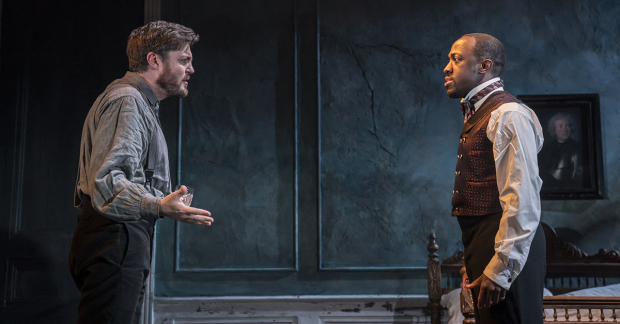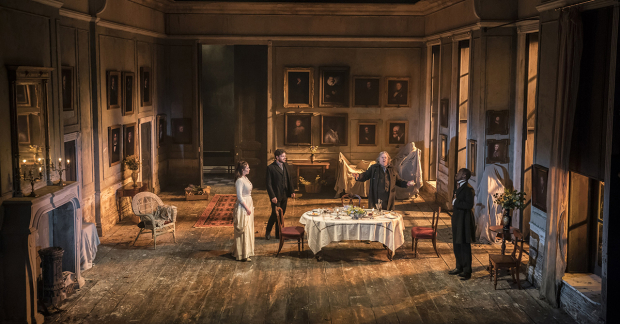Did critics rave about the Rosmersholm revival?
Find out what the official verdict is on the new production starring Hayley Atwell, Tom Burke and Giles Terera

© Johan Persson
Sarah Crompton, WhatsOnStage
★★★★
"Ibsen may have written this play in 1886, worried about developments in the political life of his native Norway, but its fiercely anxious examination of the need for value in public life, the purpose of politics and the importance of female emancipation speak pretty loudly, in Duncan Macmillan's ritzy, punchy translation, in the age of Brexit and Trump."
"Director Ian Rickson unpicks the dynamics between this central trio with forensic clarity and an almost dreamlike fervour and he's helped by performances from Hayley Atwell, Tom Burke and Giles Terera that dig deep into their tortured motivations."
"Designer Rae Smith makes the setting a participant in the action, with its vast echoing spaces, peeling walls from which the portraits of Rosmer's ancestors gaze down like so many accusing fingers."
Henry Hitchings, Evening Standard
★★★★
"Atwell and Burke smoulder in this rarely revived play by Ibsen. It's a haunting vision of two passionate characters weighed down by the past – and despite being more than 130 years old, feels sharply up-to-date in its sense of the ugly ambition and wild hypocrisy that can thrive at a time of political crisis. "
"The play is a hard one to get right – full of protracted conversations and scenes that verge on melodrama. But here, in a crisp new version by Macmillan, it's absorbing. Rickson's production is expertly paced, and there are vivid supporting performances, notably from Peter Wight as exhausted radical Brendel, at times looking remarkably like Steve Bannon."
Natasha Tripney, The Stage
★★★
"Atwell is superb as the passionate, ambitious, persuasive and complex Rebecca, a woman who knows her own heart and her own mind. She's not painted as a manipulator, rather a woman making the most of the limited power she has. She radiates intelligence and frustration, to the point that she somewhat overshadows Burke's guilt-ridden Rosmer. Though he captures the character's idealism, inner conflict and self-questioning nature, his is, by necessity, quite an inward performance.
"Terera is compelling as Kroll. He all but spits the words "liberated woman" when talking about Rebecca, but he also shows us the cracks in his moral rigidity. Wight injects some levity into his performance as Brendel, Rosmer's old tutor. His brief scenes liven up an otherwise dour production."

© Johan Persson
Dominic Cavendish, The Telegraph
★★★★
"Rickson's eye is on everything – and your eye will be too, as you observe the shifting relationship and power-dynamic between Burke's mournful yet idealism-filled pastor John Rosmer, whose wife drowned herself at the nearby mill, and the live-in assistant (Atwell's Rebecca West) who has quietly transformed, and liberated, his thinking."
"Burke is grave, earnest, weighing his words, holding out his hands in a helpless fashion, as if being dragged somewhere by an unseen force; between them swirl eerie, vaguely erotic currents of self-denial and mutual fascination. They make exposition-laden talk sound natural, build subtly to points of violent psychological distress."
Ann Treneman, The Times
★★★★
"Atwell is riveting as Miss West, a complicated and passionate woman who can't seem to decide if she actually fancies the pastor or just wants to talk about free thought the whole time. It is hard to take your eyes off her, and the pastor agrees. Burke plays him with a fiery rage and a fine old-fashioned oratory. There are other excellent performances here too, especially Lucy Briers as the seen-it-all housekeeper Mrs Helseth."
"Rickson directs, stoking the passion, political and emotional, although it does take the occasional melodramatic turn. That is quickly absorbed by the sheer austerity of the set."


















